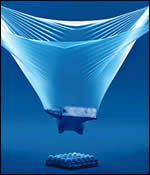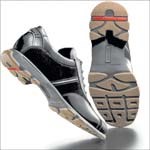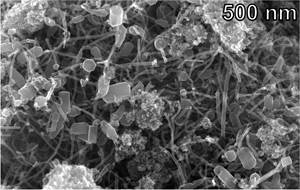TPUs Get Softer, Slicker, Lighter
BASF Corp., Wyandotte, Mich., has launched a new range of thermoplastic poly urethanes that push the performance envelope in several directions.
BASF Corp., Wyandotte, Mich., has launched a new range of thermoplastic poly urethanes that push the performance envelope in several directions. The company has broken new ground with a non-plasticized soft TPU and a low-density TPU foam for shoe soles and cables. Other new developments include TPUs with inherently low coefficient of friction and a new entry to compete with PP and polyester in elastic nonwovens.
Soft without plasticizer
One of the first non-plasticized soft TPUs on the market is BASF's Elastollan HPM series, which comprises four products ranging from 65 Shore A to 85 Shore A hardness. Due to their special polyester chemistry, the materials crystallize quickly and have molding characteristics similar to plasticized TPUs at the same hardness, according to BASF. They also have a higher softening point than other products of the same hardness and thus can be used at higher end-use temperatures.
Previously, to make TPUs softer than other 80A required plasticizers. But plasticizers can be vulnerable to extraction, resulting in gradual rehardening. And in overmolding applications, plasticizers can attack polycarbonate or ABS substrates, causing crazing. This is not a problem with the new HPM series, which also boasts good adhesion to rigid thermoplastics like PC and ABS. Fast crystallization leads to short molding cycles and also facilitates thin-wall extrusion.
The HPM series has strong potential in bearing dust covers, according to Armando Sardanopoli, product development and technical service manager. Other applications include seals and mounting-plate rings, where pressure deformation and temperature resistance are needed, as well as ball-joint seals. The 75A grade is available in the U.S. and Europe, while the 85A product is commercial in Europe. The 65A and 70A materials are in development in Europe.
Less tacky—naturally
BASF has also developed a new material technology that combats the inherent tacky nature of soft TPUs without the need for additives. The patented Elastollan LoTac series achieves a lower coefficient of friction and also maintains transparency. Elastollan WY09290-1 is a polyether-based product while WY09090-1 is polyester-based.
The LoTac series eliminates tackiness without lubricants, waxes, or inorganic fillers. Thus there is no potential for additive blooming or negative effects on performance, adhesion, transparency, and other aesthetics of the end product. A LoTac grade with 90A hardness exhibits a coefficient of friction 90% lower than a standard TPU of similar hardness, says BASF.
Elastollan LoTac products are claimed to have a wider processing window in applications like blown film and sheet extrusion for automotive and industrial markets. BASF is targeting tubing, cable jacketing, tapes, and fabric lamination.
Foam gets lighter
For lightweight foam, BASF has unveiled the Elastollan Light range of TPUs that utilize a special blowing agent to reduce density up to 60% in shoe soles, cable jacketing, sheet, tubing, and profiles. The foaming agent formulated by BASF comes in granular form and is typically added in amounts up to 8%. Density of a typical TPU can be reduced from 1.2 g/cc to about 0.4 g/cc while maintaining the same relative toughness (proportional to density). TPUs made with the proprietary blowing agent exhibit homogeneous and well distributed cells, according to Rabeh Elleithy, senior technical service representative.
Elastollan Light is being used in Europe to replace rubber and PVC in shoe soles. BASF is working with U.S. processors on new applications that utilize the low-density foam as a cable filling. Flame-retardant formulations are also being explored.
Inherent elasticity
For the elastic nonwovens market, BASF has launched new custom TPU formulations that boost performance. These materials, both polyester- and polyether-based, are claimed to offer high elasticity in all directions and high strength and good sealing capability.
About 40% of the nonwovens market uses extruded filaments for melt-blowing and spun-bonding. The dominant materials are polypropylene or PET, which are inherently non-elastic. Currently, elasticity in nonwovens is usually achieved in one direction either mechanically or by integrating elastic bands or tapes. A big advantage of the new TPUs is their ability to make bidirectionally elastic nonwovens in one step.
These new formulations are said to offer elongation over 300%, plus better recovery, sealing, and filtering performance than PP or PET. The TPUs come in a range of hardnesses and can be more easily customized than PP or PET, says BASF. Key market areas include textiles, medical, filtration, and apparel.
Related Content
Research Suggests Path From Waste Plastics to High Value Composites
Flash joule heating could enable upcycling of waste plastic to carbon nanomaterials.
Read MoreRead Next
Lead the Conversation, Change the Conversation
Coverage of single-use plastics can be both misleading and demoralizing. Here are 10 tips for changing the perception of the plastics industry at your company and in your community.
Read MorePeople 4.0 – How to Get Buy-In from Your Staff for Industry 4.0 Systems
Implementing a production monitoring system as the foundation of a ‘smart factory’ is about integrating people with new technology as much as it is about integrating machines and computers. Here are tips from a company that has gone through the process.
Read MoreAdvanced Recycling: Beyond Pyrolysis
Consumer-product brand owners increasingly see advanced chemical recycling as a necessary complement to mechanical recycling if they are to meet ambitious goals for a circular economy in the next decade. Dozens of technology providers are developing new technologies to overcome the limitations of existing pyrolysis methods and to commercialize various alternative approaches to chemical recycling of plastics.
Read More (2).jpg;maxWidth=970;quality=90)








 (2).jpg;maxWidth=300;quality=90)




 (1).jpg;maxWidth=970;quality=90)